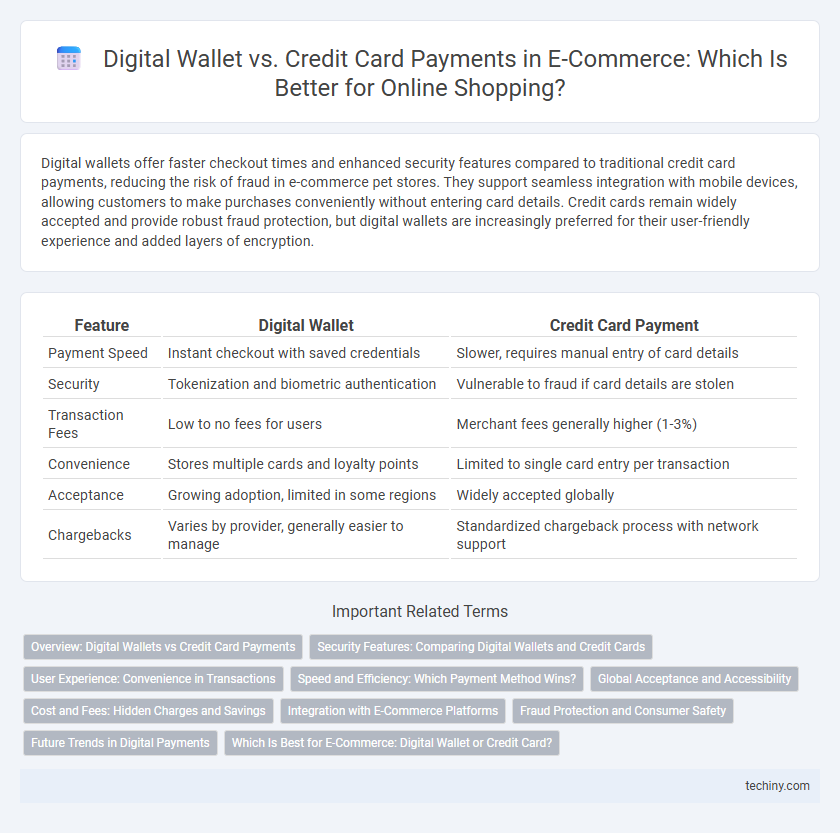Digital wallets offer faster checkout times and enhanced security features compared to traditional credit card payments, reducing the risk of fraud in e-commerce pet stores. They support seamless integration with mobile devices, allowing customers to make purchases conveniently without entering card details. Credit cards remain widely accepted and provide robust fraud protection, but digital wallets are increasingly preferred for their user-friendly experience and added layers of encryption.
Table of Comparison
| Feature | Digital Wallet | Credit Card Payment |
|---|---|---|
| Payment Speed | Instant checkout with saved credentials | Slower, requires manual entry of card details |
| Security | Tokenization and biometric authentication | Vulnerable to fraud if card details are stolen |
| Transaction Fees | Low to no fees for users | Merchant fees generally higher (1-3%) |
| Convenience | Stores multiple cards and loyalty points | Limited to single card entry per transaction |
| Acceptance | Growing adoption, limited in some regions | Widely accepted globally |
| Chargebacks | Varies by provider, generally easier to manage | Standardized chargeback process with network support |
Overview: Digital Wallets vs Credit Card Payments
Digital wallets offer a secure, fast, and contactless payment solution by storing multiple payment methods in one app, enhancing convenience for e-commerce transactions. Credit card payments remain widely accepted and trusted, providing robust fraud protection and the ability to finance purchases via credit limits. The choice between digital wallets like Apple Pay or Google Pay and traditional credit card payments often depends on user preference for speed, security features, and acceptance across online retailers.
Security Features: Comparing Digital Wallets and Credit Cards
Digital wallets use tokenization and biometric authentication, significantly reducing the risk of fraud compared to traditional credit card payments, which rely on static card details vulnerable to theft. Advanced encryption protocols in digital wallets protect sensitive data during transactions, while credit cards often expose card numbers and CVV codes. Real-time transaction monitoring and instant fraud alerts further enhance the security profile of digital wallets, making them a safer choice for online payments.
User Experience: Convenience in Transactions
Digital wallet payments enhance user experience by enabling faster checkout with stored payment information and biometric authentication, reducing the need to manually enter card details. Credit card payments, while widely accepted, often require more steps and can lead to slower transaction times, especially on mobile devices. Digital wallets also improve convenience by integrating loyalty programs and receipts, creating a seamless and efficient transaction flow for e-commerce users.
Speed and Efficiency: Which Payment Method Wins?
Digital wallets significantly outperform credit card payments in speed and efficiency by enabling instant transactions with a simple tap or scan, reducing checkout time to mere seconds. Unlike credit card payments that often require manual entry or PIN verification, digital wallets streamline the process through stored payment credentials and biometric authentication. This optimized payment flow enhances user experience and increases conversion rates in e-commerce platforms.
Global Acceptance and Accessibility
Digital wallets offer enhanced global acceptance by supporting multiple currencies and seamless transactions across diverse international platforms, making them ideal for cross-border e-commerce. Credit card payments remain widely accepted worldwide, benefiting from established networks like Visa and Mastercard that facilitate secure, familiar processing. Accessibility varies as digital wallets require internet connectivity and smartphone access, while credit cards provide offline transaction options, ensuring usability in regions with limited digital infrastructure.
Cost and Fees: Hidden Charges and Savings
Digital wallets typically reduce transaction fees for merchants compared to traditional credit card payments, leading to potential savings reflected in product pricing. Credit cards often involve hidden charges such as interchange fees, annual fees, and interest rates, which can increase overall costs for consumers and businesses alike. Utilizing digital wallets minimizes exposure to these fees, offering transparent cost advantages and promoting efficient financial transactions in e-commerce.
Integration with E-Commerce Platforms
Digital wallet integration with e-commerce platforms offers seamless, secure transactions through APIs and SDKs, enhancing user experience and reducing cart abandonment rates. Credit card payment systems require compliance with PCI DSS standards and often depend on third-party payment gateways, which may introduce additional transaction fees and processing delays. Advanced digital wallets support multi-factor authentication and tokenization, providing superior fraud protection compared to traditional credit card payments.
Fraud Protection and Consumer Safety
Digital wallets employ advanced encryption and tokenization technologies to significantly reduce the risk of fraud compared to traditional credit card payments. Unlike credit cards, digital wallets often require multi-factor authentication, enhancing consumer safety by preventing unauthorized transactions. Real-time transaction monitoring and instant fraud alerts further protect users, making digital wallets a more secure option in the e-commerce space.
Future Trends in Digital Payments
Digital wallets are rapidly evolving with biometric authentication and AI-driven fraud detection, positioning them as the future standard in secure e-commerce transactions. Credit card payments continue to adapt by integrating tokenization and contactless technology, maintaining their relevance in global digital commerce. Emerging trends indicate seamless, multi-platform payment interoperability and blockchain-based solutions will dominate next-generation digital payment ecosystems.
Which Is Best for E-Commerce: Digital Wallet or Credit Card?
Digital wallets offer faster checkout speeds and enhanced security through tokenization, making them increasingly popular in e-commerce transactions. Credit cards provide broad acceptance and extensive fraud protection policies, which many consumers still rely on for trust and convenience. The best choice for e-commerce depends on user preference for convenience and security, with digital wallets excelling in mobile shopping and credit cards favored for versatile use.
Digital Wallet vs Credit Card Payment Infographic

 techiny.com
techiny.com